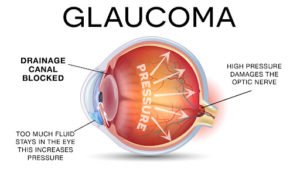Ms. Esther, a 90 year-old retired Language Arts teacher, once enjoyed reading and needle work; activities she can no longer do because of glaucoma. Ms. Esther recalls vision problems most of her life – wearing glasses at a very young age and using prescription eye drops in her twenties. She is unable to recall when she was officially diagnosed with glaucoma, but she has been legally blind for four years.

Glaucoma is a hereditary disease. Both Ms. Esther’s mother and grandmother had the diagnosis, which led to blindness for both women.
Ms. Esther can see shadows depending on the weather – sunny days are better for her vision than cloudy days. Most of us turn on lights or sit closer to a lamp to see better; however, artificial light does not improve her vision but can worsen it.
Ms. Esther must take extra care protecting her eyes as air conditioning, heaters, and wind can cause dryness and irritation. She is very diligent keeping up with her eye drops.

Ms. Esther lives by herself in her home. I encountered Ms. Esther when she called into Empowerline seeking assistance with cleaning her home. Due to vision loss, she cannot see to clean. Though she can still wash dishes and do laundry, chores are time consuming.
Ms. Esther depends on her sense of touch, her hearing, and her memory to manage day-to-day activities. She feels her way around her home and must be careful where she puts her hands. She has bump dots to use appliances such as her washer/dryer and microwave. She rehearses her tasks before she begins – talking herself through the steps, what utensils she will need if cooking, and aligns everything on the counter. She prepares her mind first, so her hands know what to do.

She says her ability to remember serves a big part in her life. She remembers where items are placed and must be disciplined to put them back in the same spot every time. She remembers which room she is in so she will know which direction to turn when moving about her home.
Ms. Esther offers a few tips for people with a glaucoma diagnosis and for their caregivers:
Communication is very important for someone helping a person with glaucoma.
For example, if putting away groceries, they must communicate with each other on where and how the groceries are put away. Ms. Esther puts her canned goods away in alphabetical order from left to right and remembers what items were bought. She reports she cannot have a lot of variety in her foods as that would be too much to remember.
Ms. Esther candidly says living with this disease depends on the person, “You can’t be a wimp.”
Glaucoma is the leading cause of blindness for people over age 60.1 The good news is that blindness from glaucoma can often be prevented with early treatment; however, because there are no symptoms, most people don’t realize they have it.
The only way to diagnose glaucoma is with a complete eye exam. A glaucoma screening that only checks eye pressure is not enough to find glaucoma. Regular eye exams can help find the disease before you lose vision.1


